Avvo founder tells lawyers to 'get rid of UPL' if they want innovation and access to justice
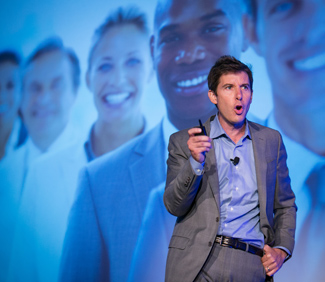
Mark Britton is the founder and CEO of Avvo. All photos by ©Kathy Anderson.
Corrected: At the close of the first day of the ABA’s House of Delegates meeting, the House’s Committee on Issues of Concern presented talks that were “intended to be provocative.”
The talks, entitled “Issues of Concern to the Legal Profession” in the day’s program, grew out of the research of the Commission on the Future of Legal Services. That commission was created last year by outgoing ABA president William Hubbard to address the problems created by the rise in pro se litigants, the ongoing lack of court funding and the rise of technology to fill some of those gaps.
Its research is ongoing, but a selection of commission members and invited guests presented some of their findings in a series of short talks in the style of the trendy TED Talks series.
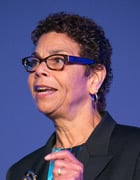
Phoebe Haddon
The moderator was commission member Phoebe Haddon, chancellor of Rutgers University-Camden. She kicked off the talk by noting that many self-represented litigants don’t even identify the cost of representation as a problem, because they don’t believe lawyers can help them.
Perhaps the most unusual speaker for this crowd was Avvo founder and CEO Mark Britton, who urged the audience to start “looking at this through the lens of innovation.” The legal profession is concerned about the unauthorized practice of law, he said, but that keeps innovators out. Meanwhile, he said, four out of five low-income litigants are unrepresented; 7.5 million people have asked questions on Avvo; and 34 percent in a survey said lawyers have nothing to offer society. Britton said the solution is for lawyers to “get rid of UPL” and partner with experts in other fields.
“As lawyers, we contribute to society, but it’s not about us; it’s about the legal consumer,” he said. “We need to understand what they need and innovate for them.”

Alex Gulotta
Bay Area Legal Aid Executive Director Alex Gulotta spoke about the “complex maze” of public interest and pro bono groups faced by people of modest means. He advocated creating a single “point of entry” for each part of the country, where people seeking justice can be helped more efficiently. He also advocated bringing those resources to bear on municipal courts, which are often not prioritized by legal aid organizations.
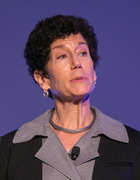
Lisa Foster
Lisa Foster, director of the Department of Justice’s Office of Access to Justice, followed with a speech that related a 1962 speech (PDF) to the ABA by Robert Kennedy to today’s conditions. In 1962, Kennedy had told the assembled ABA members that minorities, the poor and non-native English speakers often don’t get the same representation as the advantaged, she said. Fifty years later, the same could be still be said about the poor, she said. The problem is exacerbated by lack of adequate funding for public defenders in many states, and the fact that financial bail is often set without regard to the defendant’s means—creating de facto debtors’ prisons.
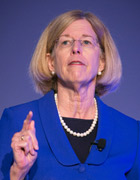
Carolyn Kuhl
Presiding Judge Carolyn Kuhl of the Los Angeles Superior Court illustrated the high pro se load in Los Angeles with photos of long lines in hallways, at help desks and even wrapped around the outside of the building. Her court has the largest caseload in the country, she said, and about half of all cases have at least one unrepresented litigant. In family law, it’s 80 percent. She suggested getting rid of procedural rules that lengthen and complicate the process, and having litigants use a TurboTax-like form to guide them through basic filings. The court has already implemented a version of the latter, with an avatar to guide people through online traffic-ticket filings.
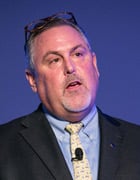
Gregory Coleman
Gregory Coleman, immediate past president of the State Bar of Florida, said his state bar was initially scared of organizations like Avvo and LegalZoom. But the two million hours of pro bono work donated in Florida last year “barely made a dent,” he said. And after studying the issue, he realized that Avvo sends work lawyers’ way. The trouble in Florida is partly the slowness of changing the rules, he said: the state’s lawyer advertisement rules were written in the time of rotary phones, and change is a slow process.
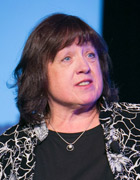
Barbara Madsen
The final speaker was Chief Judge Barbara Madsen of the Supreme Court of Washington. Starting in the mid-1990s, she said, Washington state “tried everything” to address a flood of pro se litigants and a rise in unauthorized practice of law. It was not enough, she said, so the state bar association decided that “maybe not every single problem needs to be solved by a lawyer.” That’s how Washington’s limited license legal technician program was born, she said, and the state bar has moved from grudging acceptance to embracing it.
“Innovation will continue with or without us, so we need to get in the driver’s seat,” she said. “We need to get on that bandwagon to change the profession before it runs us over. And I believe that, given the statistics I’ve heard, maybe we’ve already been run over.”
See also:
ABAJournal.com: “Disruptive innovators try to convince skeptical attorneys of the need to collaborate”
• See what people are saying about the events on social media, and follow along with our full coverage of the 2015 ABA Annual Meeting.
Corrected on Aug. 7 to note that the presentations before the House of Delegates were sponsored by the House’s Committee on Issues of Concern.



